You Don't Like the Truth: 4 Days Inside Guantanamo is a film of genre Documentary directed by Luc Côté released in USA on 1 january 2010
You Don't Like the Truth: 4 Days Inside Guantanamo (2010)
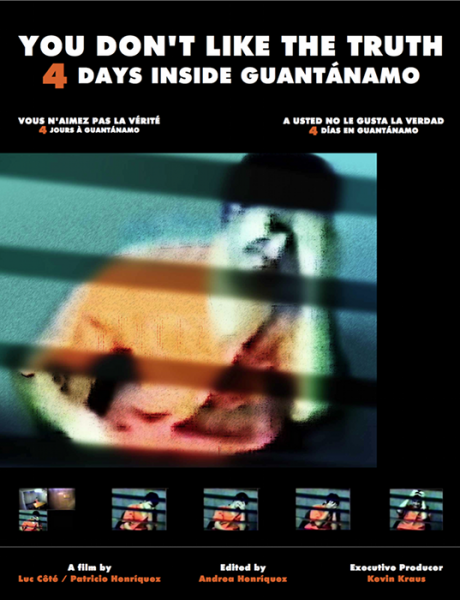
If you like this film, let us know!
Released in USA 1 january 2010
Genres Documentary
Themes Prison films, Films about terrorism, Documentary films about law, Documentary films about war, Documentary films about historical events, Political films
Rating72%










You Don't Like The Truth: Four Days Inside Guantanamo is an award-winning 2010 documentary. The film focuses on the recorded interrogations of Canadian child soldier Omar Khadr, by Canadian intelligence personnel that took place over four days from February 13–16, 2003 while he was held at Guantanamo. It presents these with observations by his lawyers and former cell mates from the Bagram Theater Internment Facility and Guantanamo Bay detention camps.
The film premiered at the Festival du nouveau cinéma in Montreal in October 2010. The film was shown to Canadian parliamentarians in October 2010. Khadr's defence attorney's planned to show the film during their summation if Khadr's trial went forward. According to the Montreal Gazette the film-makers Luc Côté and Patricio Henriquez also produced a series of short YouTube videos as a companion to the feature-length documentary.
Comments
Leave comment :
Suggestions of similar film to You Don't Like the Truth: 4 Days Inside Guantanamo
There are 0 films with the same director, 8965 with the same cinematographic genres, 9530 films with the same themes (including 2 films with the same 6 themes than You Don't Like the Truth: 4 Days Inside Guantanamo), to have finally 70 suggestions of similar films.If you liked You Don't Like the Truth: 4 Days Inside Guantanamo, you will probably like those similar films :
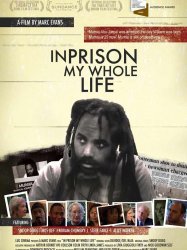
In Prison My Whole Life (2008)
, 1h39Directed by Marc Evans
Origin United-kingdom
Genres Documentary
Themes Prison films, Films about terrorism, Documentary films about law, Documentary films about war, Documentary films about historical events, Documentary films about politics, Documentary films about terrorism, Political films, Films about capital punishment, Documentary films about law enforcement
Actors Mos Def, Snoop Dogg
Rating66%





Au moment même où William Francome nait, le 9 décembre 1981, un homme est arrêté pour le meurtre d’un policier de l’autre côté de l’Atlantique. Cet homme est noir, journaliste et ancien Black Panther. Il s’appelle Mumia Abu-Jamal.

The Cats of Mirikitani (2006)
, 1h14Genres Documentary
Themes Films based on the September 11 attacks, Prison films, Films about racism, Films about religion, Films about terrorism, Transport films, Aviation films, Documentary films about the visual arts, Documentary films about racism, Documentary films about law, Documentary films about war, Documentary films about historical events, Documentaire sur une personnalité, Documentary films about politics, Documentary films about religion, Documentary films about technology, Documentary films about terrorism, Political films, Films about Islam, Documentary films about World War II, Disaster films, Films about aviation accidents or incidents, Films about hijackings
Rating81%





In 2001 Japanese American painter, Jimmy Mirikitani (born Tsutomu Mirikitani), and over 80 years old, was living on the streets of lower Manhattan. Filmmaker, Linda Hattendorf, took an interest and began
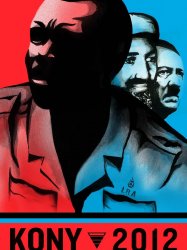
Kony 2012 (2012)
, 30minutesDirected by Jason Russell
Origin USA
Genres Documentary
Themes Films set in Africa, Films about children, Films about terrorism, Documentary films about law, Documentary films about war, Documentary films about historical events, Documentaire sur une personnalité, Documentary films about politics, Documentary films about terrorism, Documentary films about child abuse, Political films, Films about child abuse
Rating44%





Kony 2012 est un événement international organisé par le groupe Invisible Children. Le but recherché est de faire connaître mondialement Joseph Kony pour mieux faciliter son arrestation. Joseph Kony est responsable de crimes d'enlèvements d'enfants pour en faire des soldats, de réduction d'enfants à l'esclavage ainsi que l'esclavage sexuel pour les jeunes filles, de nombreux massacres civils, d'exactions et de nombreuses destructions et pillages réalisés par les troupes de chocs. Ce criminel est resté dans le silence pendant une vingtaine d'années à commettre ses crimes sans en payer les conséquences.

4 Little Girls (1997)
, 1h42Directed by Spike Lee
Origin USA
Genres Documentary, Historical
Themes Films about racism, Films about terrorism, Documentary films about racism, Documentary films about law, Documentary films about war, Documentary films about historical events, Documentaire sur une personnalité, Documentary films about politics, Documentary films about terrorism, Political films
Actors Ossie Davis, Spike Lee, Bill Cosby, Walter Cronkite
Rating77%





Film documentaire, 4 little girls revient sur l'attentat à la bombe dans une église afro-américaine qui, en 1963, tua quatre fillettes âgées de 11 à 14 ans.

Fahrenheit 9/11 (2004)
, 1h57Directed by Michael Moore
Origin USA
Genres Documentary
Themes Films based on the September 11 attacks, Films about religion, Films about terrorism, Transport films, Aviation films, Documentary films about law, Documentary films about war, Documentary films about historical events, Documentary films about politics, Documentary films about religion, Documentary films about technology, Documentary films about terrorism, Political films, Films about Islam, Dans un avion, Disaster films, Films about aviation accidents or incidents, Films about hijackings
Actors Michael Moore, Ben Affleck, Stevie Wonder, Larry King, Ricky Martin, Robert De Niro
Rating74%





The movie begins by suggesting that friends and political allies of George W. Bush at Fox News Channel tilted the election of 2000 by prematurely declaring Bush the winner. It then suggests the handling of the voting controversy in Florida constituted election fraud.
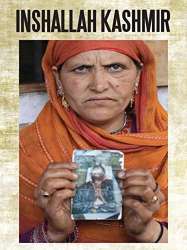
Inshallah, Kashmir (2012)
, 1h22Directed by Ashvin Kumar
Genres Documentary
Themes Films about terrorism, Documentary films about law, Documentary films about war, Documentary films about historical events, Documentary films about politics, Documentary films about terrorism, Political films
Rating68%





The film opens with ex-militants describing the torture they underwent when captured by the army. A Hindu describes his sentiment on being a part of the minority in the region at the height of militancy, when his grandfather was shot dead by militants. A politician and her husband describe the horror of being kidnapped and in captivity for over a month – and despite that, forming a human bond with the militants, and helping them escape when the army closed in on them. One understands from this section that militancy was not binary in nature. It was a dynamic and complex, resulting from various socio-political, economic and religious issues.
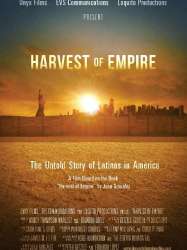
Harvest of Empire (2012)
, 1h30Origin USA
Genres Documentary
Themes Films about terrorism, Documentary films about law, Documentary films about war, Documentary films about historical events, Documentaire sur une personnalité, Documentary films about politics, Documentary films about terrorism, Political films
Rating75%






Directed by Omar Amiralay
Genres Documentary
Themes Films about religion, Films about terrorism, Documentary films about law, Documentary films about war, Documentary films about historical events, Documentary films about politics, Documentary films about religion, Documentary films about terrorism, Political films, Films about Islam

Fahrenhype 9/11 (2004)
, 1h20Origin USA
Genres Documentary
Themes Films based on the September 11 attacks, Films about religion, Films about terrorism, Transport films, Aviation films, Documentary films about law, Documentary films about war, Documentary films about historical events, Documentary films about politics, Documentary films about religion, Documentary films about technology, Documentary films about terrorism, Political films, Films about Islam, Dans un avion, Disaster films, Films about aviation accidents or incidents, Films about hijackings
Actors Ron Silver, Michael Moore
Rating49%





 , 1h20
, 1h20Directed by Roger Spottiswoode
Origin USA
Genres Documentary
Themes Films set in Africa, Films about racism, Films about religion, Films about terrorism, Documentary films about racism, Documentary films about law, Documentary films about war, Documentary films about historical events, Documentaire sur une personnalité, Documentary films about politics, Documentary films about religion, Political films, Films about Jews and Judaism
Rating71%





 Connection
Connection